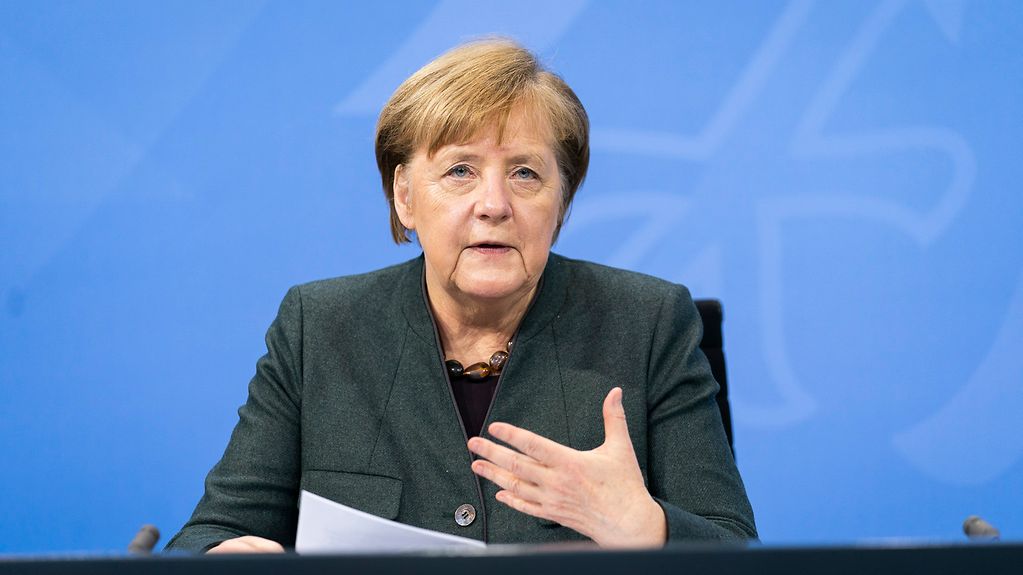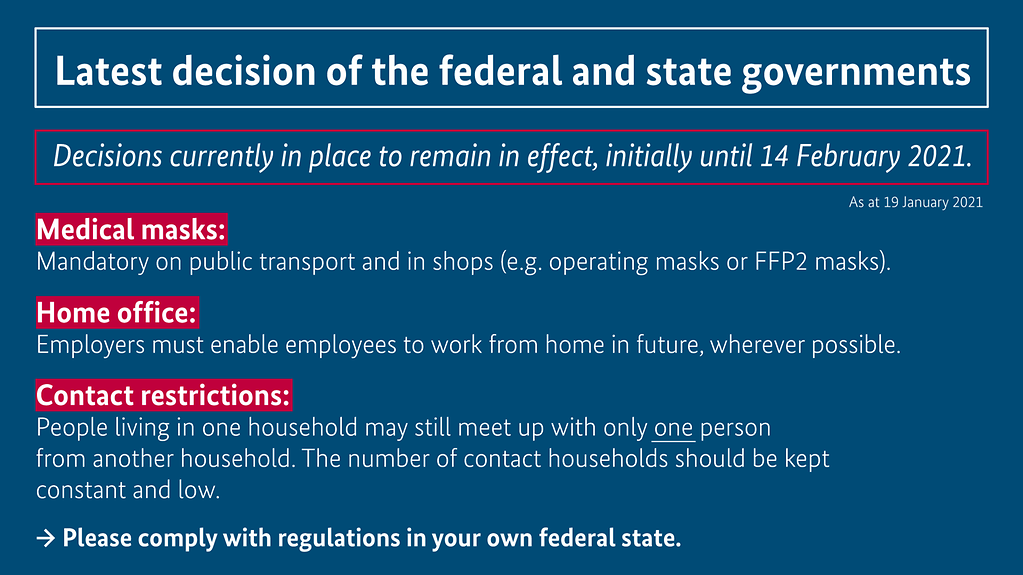Federal and state government decision
The Chancellor and the state premiers of Germany’s sixteen federal states have agreed to extend the COVID-19 measures currently in place until 14 February. Since a mutation of the virus has been identified, that threatens to negate the efforts made to contain the pandemic, federal and state governments intend to adopt a pro-active approach to address this threat.
5 min reading time

"What we have to expect of people once again is tough,“ stressed Chancellor Angela Merkel after her consultations with the federal states.
Photo: Bundesregierung/Kugler
The numbers of new cases, which are currently dropping, "are grounds for hope for all of us; they are also a source of encouragement for us," underscored Chancellor Angela Merkel, following her consultations with the premiers of Germany’s federal states. Everything points to the fact that the tough restrictions Germany has seen over the last few weeks are now paying off.
The federal and state governments came together earlier than originally planned for consultations. The mutation of the SARS-CoV-2 virus which has been seen particularly in the United Kingdom and Ireland is a "serious risk" to "all of our efforts to contain the spread of the virus," said Angela Merkel. The mutation has already been identified in Germany. "We have to act now" – now there is still time to address this threat, she underlined. If the mutation is allowed to spread, though, the numbers of new cases could increase dramatically.
Read the full decision taken by the federal and state governments on 19 January 2021.
The federal and state governments point out that the British health authorities and the vast majority of scientists are extremely alarmed, "because the epidemiological evidence points to the mutation B1.1.7. being significantly more contagious than the virus we have faced to date," as the decision puts it. There is thus agreement that Germany must urgently take a pro-active, precautionary approach now, explained Angela Merkel.
"What we have to expect of people once again is tough, but the precautionary principle is our priority, and we have to take this into account now," explained Angela Merkel. The Chancellor and the state premiers thus agreed the following at the consultations that had been brought forward:
Contact restrictions remain in place
The measures currently adopted by the federal and state governments will remain in place, initially until 14 February 201. A working group composed of representatives of the federal and state levels is to produce a strategy for a fair and safe easing of the lockdown by that date.
The rules for private gatherings remain unchanged. Households may still meet up with only one other person from outside the household. The number of contact households should also be kept constant and as low as possible. As a general rule, contacts should continue to be kept to the absolute essential minimum.
"We have extended the obligation to wear masks"
In addition it was agreed that in public transport and in shops it will be mandatory to wear medical masks, i.e. surgical masks or KN95 or FFP2 masks. The federal and state governments have issued a general recommendation that medical masks be used whenever there is closer or prolonged contact or in contact with other people, in particular in enclosed spaces.

Federal and state governments have extended measures to contain the pandemic
Heading: Latest decision of the federal and state governments
Caption: Decisions currently in place to remain in effect, initially until 14 February 2021. As at 19 January 2021
Point 1: Medical masks: Mandatory on public transport and in shops (e.g. operating masks or FFP2 masks)
Point 2: Home office: Employers must enable employees to work from home in future, wherever possible
Point 3: Contact restrictions: People living in one household may still meet up with only one person from another household. The number of contact households should be kept constant and low.
Footer: Please comply with regulations in your own federal state.
Photo: Bundesregierung
Making home office possible
To reduce contacts on public transport, companies must enable their employees to largely work from home. Wherever possible and when the type of work performed permits, companies should offer the option of working from home. The Federal Ministry of Labour and Social Affairs will be issuing an ordinance on this subject. It will remain in effect until at least 15 March.
Where the nature of work performed makes it essential to be present in person, and it is not possible to distance, companies should provide employees with medical masks.
Schools to close until mid-February
Schools were the subject of long discussion and debate, and everyone is very well aware of the fact that this is an "incredible restriction", said Angela Merkel of the decisions relating to schools and childcare facilities. But, there is credible evidence that the mutated form of the virus spreads more quickly among children and adolescents. "We must take such evidence very seriously indeed," explained Angela Merkel.
That is why it is necessary to extend the decisions taken on 13 December 2020 until 14 February 2021, and to implement them in a restrictive manner, said Angela Merkel. Schools will, as a rule, remain closed, and compulsory attendance will be suspended. Emergency cover will be ensured, and remote learning offered; special regulations can be introduced for the final grades of schools. The same procedure will be adopted in nurseries.
Protection in pension and nursing homes, and facilities for people with disabilities
It will be mandatory for staff working in pension, nursing and care homes to wear FFP2 masks when they are in contact with residents. At least until both vaccinations have been made available to everyone in the home, staff and visitors will be required to take a rapid test. Similar provisions will apply in facilities for people with disabilities.
Supporting local public health offices
The federal states are to increase the staff of local public health offices such that across-the-board contact tracing is again possible, until a seven-day incidence of 50 new cases per 100,000 people is achieved again.
The federal government will support the federal states with the nationwide recording and tracing of transmission chains. "It is important that we get down to a level of 50 quickly, so that we can talk about easing restrictions," said Angela Merkel.
Interim assistance III to be further improved
The federal government will simplify access requirements and significantly raise the top monthly assistance payments for companies and the solo self-employed. In the case of the retail trade, which has been particularly hard hit, write-downs for unsold seasonal products will be taken into account under fixed costs. The requirement that affected companies file for insolvency will be suspended until the end of April.
Uniform European approach needed
The Chancellor stressed that she would do what she can to encourage Germany’s neighbouring countries to take similar action. Germany will not be successful in controlling the pandemic, if not all countries are on the same page. If there is no uniform procedure, precautions will have to be taken, said Angela Merkel. On Thursday the heads of state and government of the European Union will come together to discuss further action to address the pandemic.